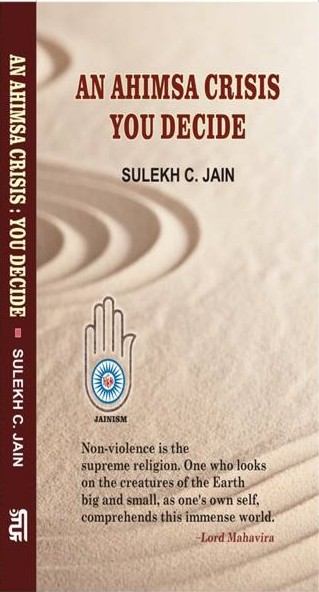Though modern civilization is characterized by a concern for fellow human beings, the foremost problem of our age is growing violence, both in thought and action. Fast evolving fields of communication and transportation have turned the world into a village. A child in Europe may have sympathy and extend help to one of his ilk in Africa. But juxtaposed is the spread of violence at individual, national and international levels, on scales, which are unprecedented. Terrorism is becoming common place and, ironically enough, respectable at some places.
With religion getting separated from, and spreading commercialization getting assimilated in daily life, we see that in the present day world killing has increased many-fold and sensitivity to life, whether animal or human, has declined in proportion. The need, therefore, is that this trend should be reversed and man should be made more humane not only in relation to man but also to other living creatures. However, one of the major problems with many of the protest groups, trying to fight against violence at national and international levels, is that personally they are not non-violent. True and effective remedy to violence could be found with personal commitment to Ahimsa inspiring personal transformation of individual, thereby creating islands of peace.
Though included in almost all religions, the doctrine of Ahimsa has been developed by Jainism to its perfection. Furthermore, its practical aspect has also been dealt with in great detail to attain maximum efficiency. So much so that in absence of continued practice Ahimsa has no value in Jainism. As the vehicle for effective implementation of their Ahimsa doctrine Jainism devised the theory of Syadvad based on the principle of Anekantvad (non-absolutism), another great contribution to world thought.
While science has been a great boon both in promoting material prosperity and rationalism, it has made our thinking, even in areas other than science, extremely definitive. Consequently those who do not agree with us are treated as wrong. Earlier dogmatism was based on ignorance, now it is caused by certitude arising out of self-righteous rational thinking. Syadvad replaces certitude with relativity in thinking. Its application to personal conduct could make the world a safer place. The present ideological conflicts would not be as intense if this principle could permeate the minds of adversaries.
This book covers all these and many more issues related to Ahimsa with an analytical but pragmatic approach. In light of the doctrines the author examines the prevailing decadence seen in ritualistic and traditional observations among Jains caused by ignorance as well as misinterpretation of the principles and doctrines. It is a thorough and well researched presentation deserving commendation.
Dr. Sulekh C. Jain has brilliantly assimilated scriptural wisdom with inspiring incidents from his long physical, social, intellectual and spiritual journey to paint this panoramic verbal canvas of Applied Ahimsa. Though doctrinally he leans on Jainism, his applied approach is all encompassing and constructive. That is the reason even his criticism is inspiring and not hurting. He puts up a forceful appeal to Jains in particular and humanity in general to ponder, interact and work towards embracing the real Jain concept of Ahimsa by making it a way of life and not just a stunted ritual.
We are thankful to Dr. Sulekh C. Jain for entrusting the publication of this thought provoking work to Prakrit Bharati Academy. Our thanks also to all other people associated with the publication project, including the scholars who wrote the preface and forewords.
D.R. Mehta
Founder & Chief Patron
Prakrit Bharati Academy, Jaipur
 Dr. Sulekh Chand Jain
Dr. Sulekh Chand Jain
